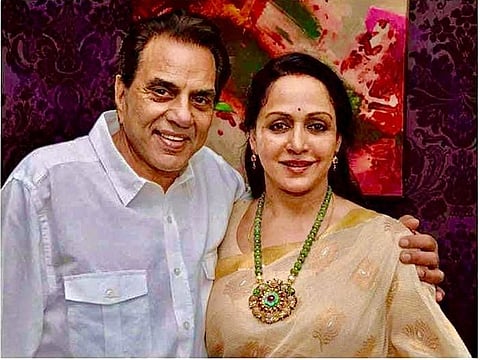When Dharmendra's soulmate Hema Malini in Dubai revealed how the two got together without religious conversion
As Bollywood mourns Dharmendra's death at 89, Gulf News revisits a tell-all interview

Dubai: For decades, Bollywood folklore has insisted that Dharmendra converted to Islam in order to marry Hema Malini. When confronted with that rumour in an earlier interview with Gulf News, Malini didn’t bristle, play coy or default to PR-speak. She simply sliced through the speculation with the directness of someone who has lived life on her own terms:
“It’s absolutely wrong… He didn’t do that — let me make it clear.”
There was no apology, no long explanation—just the unwavering calm of a woman who never needed external validation to justify her choices.
That composure has defined her from Sapnon Ka Saudagar in 1968 to her current political and artistic chapters. Long before social media PR teams and digital-friendly publicists, Malini belonged to an old-school star ecosystem—where your craft did the heavy lifting.
When we met her at a Malabar Gold event in Dubai back in 2018, she arrived without an entourage. No stylist hovered with pins and hair spray; no assistant fussed over her sari pleats. She did her own make-up. On the rare occasion she couldn’t fasten the buttons on the back of her blouse, she simply asked me, the sole journalist on call to interview her, to help her fix her tunic,.
“That will do. Everyone will look at my face, right?” she laughed, unbothered.
The “Dream Girl” tag, once conceived as a marketing ploy by her debut film’s producer, proved oddly prophetic. With more than 150 films across four decades, Malini is one of the few Bollywood actresses who continued to command meaty roles long after her industry peers faded into genteel retirement. When most actresses of her era were flattened into supporting wives or gracious mothers, Malini was starring opposite Amitabh Bachchan in the 2003 hit Baghban, playing a woman navigating love, dignity and betrayal in her fifties.
Even then, she hesitated.
“At the time of Baghban, even though my children were all grown up, I was very hesitant to take it up,” she admitted. It was her mother who insisted she do the film. That nudge led to one of the most culturally durable romances Indian cinema has produced about ageing and love. It also ensured that a generation of viewers met her not through Sholay or Seeta Aur Geeta, but through the emotional weight of late-life partnership.
Her longevity, Malini insists, comes from discipline, not nostalgia. Dance was never a vanity pursuit; it was an anchor. Touring the world with her daughters, Esha and Ahana, she kept her body and her audience sharp.
“Maybe that’s why I survived for so long,” she said.
Others from her era stopped working. She didn’t. Audiences didn’t forget her because she never stopped performing in front of them.
And then there are the subtler twists of fate.
The Tamil Nadu-born actress once lost a South Indian role for being “too slim,” a rejection that now sits like a hinge in her personal mythology.
“Otherwise I wouldn’t be sitting here,” she smiled. “I would have just vanished and my whole story would have been over.”
It is difficult, in 2025, to appreciate what she represented at her peak. Malini didn’t bend to industry pressures in the ‘70s or ‘80s. She did double roles, flirted with anti-hero characters, and played morally complex figures without revealing clothes or performative sexuality. She embodied glamour while quietly enforcing boundaries that would today be praised as feminist agency. In her vocabulary, it was simpler:
“When an opportunity comes, I don’t leave it — whether it’s dance, politics or films.”
But her most radical choice wasn’t cinematic. It was personal. Her romance with Dharmendra — then married, adored, and larger than life — remains one of Bollywood’s most analysed love stories. The relationship was shrouded in rumour: conversions, hidden marriages, Muslim identities.
Malini rejects the mythology with the same calm she has applied to everything else.
“It’s very wrong. I don’t know why people keep saying that.”
There’s no moral lecture, no mea culpa. Her life, she says, is an open book.
“There’s nothing wrong in my life that I should hide something.”
That openness extended to her professional relationships too. She denies the popular accusation that she orchestrated her daughter Esha’s career.
“Not at all. If I was, I would have done it better,” she laughed.
It was a brutally pragmatic statement from a woman who has outlasted box-office trends, gossip cycles and cultural judgement.




